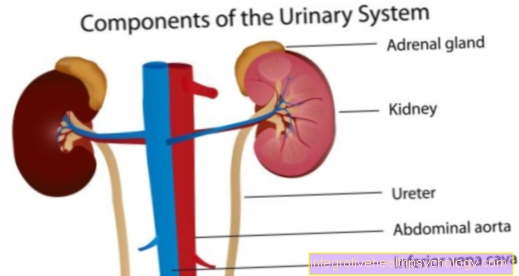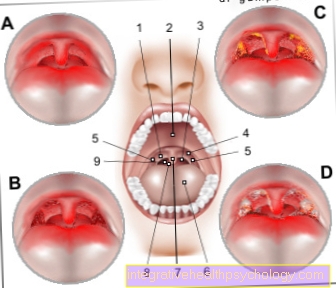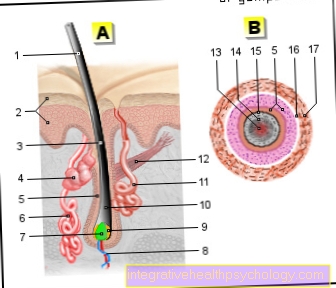Scratchy throat
Definition - What is a scratchy throat?
A scratchy throat is an uncomfortable feeling that occurs especially when swallowing and can be accompanied by difficulty swallowing or hoarseness. Often the sore throat precedes a cold or flu, but it can also be caused by an allergic reaction or heartburn.

therapy
In most cases, a scratchy throat is harmless. The scratching is often followed by a flu-like infection or a simple sore throat. As long as the symptoms are not too bad, there is no need to see a doctor. It is sufficient for those affected to take it easy, drink enough and possibly take pain reliever medication. However, if you have a high fever or severe pain, you should consult a doctor. It is also advisable to see a doctor if you suspect an allergic reaction or food intolerance. A family doctor, ENT doctor or dermatologist can do an allergy test and diagnose any intolerances.
If the scratching in the throat is due to irritation (e.g. from cigarette smoke), those affected should simply withdraw from the irritation. It also helps to drink plenty of fluids and thereby keep the lining of the throat moist. A moist mucous membrane remains intact and pathogens have a harder time settling.
In addition to a number of home remedies, there are also various medications that effectively relieve the irritation of the cough. These are cough suppressants (antitussives), which quench dry coughs and are available in any pharmacy without a prescription.
Read more on this topic at: Sore throat - what to do
Which home remedies can help?
When it comes to a scratchy throat, many people turn to one of the most popular home remedies first - a cup of hot tea. Soothing herbal teas such as chamomile, sage or peppermint are particularly suitable. The warming liquid and the aromatic oils it contains relieve sore throats and moisturize the mucous membrane of the throat. The tea can also be used for steam inhalation. To do this, the hot tea is placed in a bowl and inhaled under a cloth. Alternatively, hot salt water can be used.
Another popular home remedy for a sore throat is ginger. Ginger is characterized by its fruity sharpness and has a healing effect. Freshly pureed or cut into thin slices, ginger can be infused with lemon juice and hot water and drunk as a tea. It is best to sweeten the drink with honey, which also has an antibacterial effect.
If you have a scratchy throat, it is important to moisten the mucous membrane sufficiently. In addition to drinking a lot, it also helps to suck cough drops, because it stimulates the flow of saliva in the mouth. It also helps to keep your neck warm (e.g. with a scarf or a warm cherry stone pillow) and to take it easy. The room climate should contain sufficient humidity, otherwise the mucous membrane of the throat can dry out further. Electric room humidifiers or wet towels over the radiators can increase the humidity in living spaces.
Read more on this topic at: Home remedies for a sore throat
homeopathy
If you have a scratchy throat, you can also resort to homeopathy. Depending on the cause and accompanying complaints, there are a number of active ingredients that can be taken. The active ingredients include Belladonna, Barium carbonicum, Apis mellifica and Nux vomica. A specialist in homeopathy or a pharmacist will advise the patient individually on which globules are best for a sore throat or difficulty swallowing.
Read more on this topic at: Homeopathy for a sore throat
Duration
How long the scratching in the throat lasts depends on the cause. If the mucous membrane is irritated by cigarette smoke, the symptoms disappear as soon as the person concerned is no longer exposed to the harmful influence. Scratching the throat as part of a flu-like infection or tonsillitis lasts until the infection has cured. Depending on the pathogen, this usually takes between three and ten days. If the symptoms are triggered by certain medications or a reflux disease, the scratching in the throat lasts for a long time and never completely disappears. In such cases, a doctor should be consulted and the next steps should be discussed with him.
What you might also be interested in in this regard: Duration of sore throat
causes
The most common cause of a sore throat is a subsequent sore throat (Pharyngitis). This is an infection of the mucous membrane of the throat, which is mostly caused by viruses (e.g. parainfluenza, rhinoceros or adenoviruses). The body's own immune defense is mobilized in the event of a cold and there is increased blood flow to the mucous membrane of the throat - those affected feel a scratchy and tingling throat. The mucous membrane in the throat is damaged by the inflammatory reaction, which makes it easier for bacteria to settle and cause bacterial superinfection. In such cases, treatment with antibiotics must be given.
Another cause of a scratchy throat is irritation from external influences, such as cigarette smoke or exhaust fumes. However, too little humidity (due to air conditioning or overheated room air) can lead to a scratchy feeling in the throat. The mucous membrane dries out and small injuries are formed, which causes scratching. Likewise, some people react to allergies or intolerances with an unpleasant scratchy throat. Heartburn also causes the throat to feel scratchy.
What you might also be interested in in this regard: Causes of Sore Throat
Itchy throat from allergy
An allergy is a hypersensitivity reaction of the immune system to so-called allergens. These are substances that do not cause a reaction in healthy people, but lead to faulty activation of the immune system in allergy sufferers. Grass pollen and early bloomers in particular lead to allergic symptoms in the respiratory tract and throat ("hay fever"). In addition to a runny nose, itching and sneezing, it can also cause a scratchy throat and difficulty swallowing. After repeated contact with the allergen through inhalation or ingestion through the mouth, the substance is recognized by the body as foreign and an immune response is triggered. Certain immune cells, the mast cells, then release inflammatory mediators such as histamine and prostaglandins. Histamine then triggers an inflammatory response, which causes the blood vessels to widen and the mucous membranes to swell.
The scratchy throat can also be caused by a histamine intolerance. This is not really an allergy, but a food intolerance. When they eat foods containing histamine, such as cheese, wine or seafood, those affected react with a cough, a scratchy throat, headache and indigestion. It is relatively easy for a doctor to determine whether the sore throat is caused by an allergy or histamine intolerance.
What you might also be interested in in this regard: Sore throat with an allergy
Sore throat from medication
Certain medications cause a scratchy throat and a dry cough as a side effect. These include above all the class of so-called ACE inhibitors (e.g. ramipril, captopril or enalapril), which are used as drugs for hypertension (high blood pressure). Many patients find the constant urge to cough very painful. Often the only option is to stop taking the medication. ACE inhibitors can be activated by an active ingredient from the group of the sartans, e.g. Losartan or valsartan. These drugs work differently, but like ACE inhibitors, they are effective in lowering blood pressure.
Read more on this topic at: Side effects of ACE inhibitors
Itchy throat due to heartburn
A sore throat can be caused by heartburn. The disease occurs when acidic stomach contents return from the stomach to the esophagus. The gastric mucosa is damaged by the aggressive stomach acid and those affected feel a scratchy throat. Frequent side effects are also dry cough, swallowing difficulties and a burning drawing behind the breastbone. Typically, the symptoms appear after eating. Stress, obesity and the consumption of alcohol or nicotine promote the development of heartburn or can make the symptoms worse.
Read more on this topic at: Heartburn - What Can I Do About It?
Sore throat after using e-cigarettes
Many e-cigarette users suffer from a scratchy throat and throat irritation after vaping. This can be due to the nicotine contained in the e-cigarette liquids. To reduce the sore throat and coughing, switching to liquids with a lower nicotine content can help. Certain aromas can also lead to coughing and scratching in the throat in sensitive people. Everyone reacts differently, which is why it helps to simply try other types of liquid if you have symptoms. The liquids for e-cigarettes usually contain both propylene glycol (PG) and vegetable glycerine (VG) as carrier liquids. PG in particular can often cause discomfort and a scratchy feeling in the throat. In such cases it can help to switch to liquids with a higher percentage of VG.
Smoking an e-cigarette draws fluid from the body, which causes the lining of the throat to dry out faster and scratch the throat. For this reason, e-cigarette users should take care to drink enough fluids.
diagnosis
A scratchy throat usually has a certain trigger and does not have to be explicitly defined by a doctor. The symptoms often go away on their own when the stimulus (allergen or environmental stimulus) is no longer present or when the cold has been cured. If the scratching persists or if the cause is undetectable, a doctor should be consulted to make the diagnosis. The doctor can examine the throat and the lining of the throat and, if necessary, carry out an allergy test or an examination for food intolerances. A general practitioner or an ENT specialist can be consulted to make a diagnosis.
Concomitant symptoms
Depending on the trigger, the scratching in the throat is accompanied by different symptoms. If you have a cold with a sore throat (Pharyngitis) people also suffer from a sore throat, runny nose, headache and cough. Fatigue, exhaustion and a general feeling of illness also indicate a flu-like infection. With a lateral cordangina, the pain radiates from the neck to the ear and the lymph nodes in the neck area are severely swollen. Fever and difficulty swallowing may also occur.
If you have an allergic reaction to pollen or animal hair, there is not only the annoying scratching in the throat, but also frequent sneezing and the discharge of clear secretions from the nose. The nasal mucosa swells, making it difficult to breathe through the nose. The eyes are red, itchy and watery. Due to the increased release of histamine in the context of the allergy, those affected are often tired and lackluster during the day.
Throat irritation
A dry cough is characterized by a scratchy or tingling sensation in the throat and a constant urge to cough. The affected people suffer from the excruciating dry cough and since no mucus is coughed up, the dry cough brings no relief. One speaks of an unproductive cough. Especially when falling asleep and at night, the coughing fits lead to restlessness and insomnia.
A common cause of dry cough is a cold, in which pathogens penetrate the body and attack the lining of the throat. The inflammation triggers the cough reflex, with which the body tries to shed mucus and foreign bodies. Typically, the cough occurs towards the end of the illness. At first, those affected feel a constant scratchy throat and a strong urge to cough, which leads to a dry cough. Those affected find the dry cough very exhausting. Later in the course of the cold, a slimy secretion forms in the airways, which can gradually be coughed up. This is known as a productive cough.
Irritation of the respiratory tract from pollen, excessively dry room air, and increased exposure to dust or smoke can also lead to a scratchy throat and a dry cough.
Burn
If the itching in the throat is accompanied by a burning sensation, this may be a sign of a sore throat (Pharyngitis) be. Other causes of burning and itching in the throat can be reflux disease, which leads to heartburn. But allergic reactions are also often associated with irritation of the mucous membrane of the throat, which leads to itching and burning in the throat. Another cause of itching and burning in the throat and mouth is the consumption of too hot or spicy food.
Read more on this topic at: Burning in the throat
hoarseness
If hoarseness occurs together with the scratching in the throat, this indicates a laryngitis (laryngitis). Other symptoms include difficulty swallowing, dry cough, and difficulty speaking. In severe cases, a complete loss of voice can occur temporarily. Those affected have the feeling that there is a foreign body in their throat and therefore they often clear their throat (forced throat clearing). Laryngitis can either be caused by voice overstrain (especially people who talk a lot and often, e.g. teachers) or a viral or bacterial infection of the voice. But heavy nicotine consumption, in addition to a scratchy throat, also leads to hoarseness.
Read more on this topic at: hoarseness
Sore throat without a cold
A scratchy throat does not automatically mean that you have a cold. The symptoms often occur even though there is no infection. Probably the most common cause of a scratchy throat without a cold is an allergic reaction or a food intolerance. Other harmless causes are irritation of the pharynx from smoke or chemicals as well as an excessively dry ambient climate.
If the scratching in the throat continues for a long time and is accompanied by a pronounced feeling of foreign bodies in the throat, it may also be a disease of the thyroid gland. The thyroid gland may be enlarged or inflamed (Thyroiditis). In most cases, inflammation of the thyroid gland is an autoimmune disease, such as Hashimoto's thyroiditis. The family doctor can examine the thyroid gland by checking the thyroid levels in the blood and scanning the thyroid gland for abnormalities. In some cases, an ultrasound scan of the thyroid may also be necessary.
Itchy throat when swallowing
A scratchy throat, especially when swallowing, indicates a sore throat or tonsillitis. The mucous membranes of the throat or tonsils are inflamed and cause pain when swallowing. A simple strep throat is usually caused by viruses and can be treated symptomatically. In contrast, tonsillitis is mostly triggered by bacteria (especially streptococci) and should definitely be treated with antibiotics to prevent serious complications and secondary diseases (acute rheumatic fever or acute glomerulonephritis).
You might also be interested in:
- Sore throat when swallowing
- Sore throat and difficulty swallowing
Itchy throat especially at night
A scratchy throat, especially at night, is often due to insufficient humidity in the bedroom. Ideally, the moisture content in the room air is around 60%. Especially in the cold winter months, the humidity in the rooms drops due to constant heating. But even in summer, the humidity can drop too much due to warm air or air conditioning. As a result, the lining of the throat dries out, the mouth becomes dry and the throat scratches. Scratching is particularly noticeable at night, as the body produces less saliva while sleeping and you swallow less.
Regular ventilation leads to an exchange of air in the rooms and the humidity is optimized. It is best to ventilate the bedroom twice a day. In addition, one sleeps better when the room temperature is a few degrees cooler than in the other rooms - the radiator in the bedroom is best left off. With the help of a hygometer, which measures the indoor climate, the humidity can be determined. In addition to humidifiers and water bowls on the heater, plants in the room also lead to an increase in humidity.
But dry coughs are also noticeable, especially at night when falling asleep. Those affected suffer from an excruciating urge to cough, which prevents them from falling asleep and staying asleep.
Can that be an indication of lung cancer?
Although a scratchy throat is almost always harmless, some people fear that it could be an indication of lung cancer. The main symptoms of lung cancer are coughing with sputum, severe chest pain, night sweats and sudden weight loss. A tumor in the lungs can also cause other complaints such as swallowing problems, sore throats and hoarseness. However, many of these symptoms also occur in other diseases, which is why there is no clear symptom that indicates lung cancer. In addition to tobacco smoke, hereditary predisposition is also one of the risk factors for lung cancer.
A scratchy throat can have many causes and in the vast majority of cases it is completely harmless. People who suffer from a scratchy throat and are very afraid of having lung cancer because of a family history or their cigarette consumption should consult and discuss this with a doctor. An X-ray can quickly reveal whether someone has a tumor in their lungs.
You might also be interested in: How do you recognize lung cancer?





























